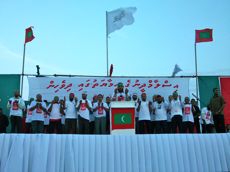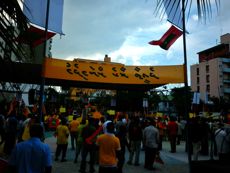Two much-anticipated protests, one to defend Islam in the Maldives and another to exhibit support for a “moderate Islam” drew crowds of thousands along Male’s eastern coast this afternoon, and thousands more on islands across the country.
Contrary to speculation, no violent outbreaks or confrontations took place on a grand scale. However, three individuals were injured during a protest against the government’s religious policies in Haa Dhaal atoll Vaikaradhoo. They have been taken to the island’s health clinic, Haveeru reports.
Meanwhile, police and national defence forces (MNDF) are maintaining close operations on Male’.
“There is no violence, so the police are continuing to survey the situation but they will not interrupt the ongoing demonstrations unless there is a confrontation,” said Sub-Inspector Ahmed Shiyam.
A coalition of NGOs and six political parties began organising a protest “to defend Islam” several weeks ago. Ruling Maldivian Democratic Party (MDP) coordinated a counter-protest after threatening messages were posted on the coalition’s promotional website. Over the past week government, religious and security officials attempted to negotiate the situation, with rumors of members of the Taliban joining the protest raising concerns over public order.
Both protests began at 4 pm today. MDP’s protest concluded at 5:30, however the “Defend Islam” protest leaders have announced they will remain in action so long as the public demands it.
Defend Islam
Banners bearing slogans including “We stand united for Islam and the nation”, “No idols in this holy land”, “No to the Zionist Murderers”, “No to El Al Airlines” and “We stand for peace” lead participants to gender segregated areas across from the Tsunami Memorial area, where approximately 20 protest leaders spoke from a mounted podium.
Speakers from various religious and political opposition parties addressed an estimated 5,000 men, women and children of varying ages and attire. Protestors were handed t-shirts and banners reading “Maldivians in defense of Islam” along with Maldivian flags.
“We don’t know there is a moderate, higher or lower Islam. We only know Islam, which is above all the religion. The only road we must follow is based of Allah’s callings,” said Jumhoree Party Leader and tourism tycoon Gasim Ibrahim.
Gasim urged the people gathered to continue the rally peacefully, assuring his party will “stand with the people to protect Islam”.
Former State Islamic Minister and current spokesperson for Adhaalath party Sheikh Mohamed Shaheem Ali Saeed said the party does not support terrorism, adding that the security forces would know the actual people provoking terrorism.
He also vowed to defeat President Nasheed in 2013 elections.
 The crowd raised cries of “Allahakbar” between speeches, and Shaheem led an oath to defend Islam in the Maldives.
The crowd raised cries of “Allahakbar” between speeches, and Shaheem led an oath to defend Islam in the Maldives.
Dhivehi Rayyithunge Party (DRP) Leader and MP Ahmed Thasmeen Ali said that he was there on behalf of DRP to assure Maldivian citizens that the party will stand with the religion of Islam.
”We are gathered here to uphold Islam for the future of the next generations,” Thasmeen said, accusing the current government of trying to establish anti-Islamic policies.
Increased diplomatic relations with Israel, including possible service of El Al airlines, and recent debates over Shariah law were among examples given.
”We are here to show that will not support those policies yet we are not extremist,” he said. ”We will stay forever as an Islamic nation.”
El Al Airlines was expected to begin service to the Maldives on December 13, but has been postponed indefinitely. The National Security Committee is currently reviewing the situation.
Half-brother of former President Maumoon Abdul Gayoom and Progressive Party of Maldives (PPM) MP Abdulla Yamin argued that President Nasheed would have stood in the front line of this gathering if he wanted to uphold Islam.
”Today they are asking whether churches could be built and idols could be kept,” Yamin said. ”And, the police do not have to defend the idols.”
Yamin accused the government of trying to abolish Arabic and Islamic studies from the country.
”The current government does not care about Arabic and Islamic Studies and has in fact disrespected Arabic and Islamic studies,” he said, reiterating that this nation will forever be an Islamic nation.
Several speakers called on the government to condemn United Nations Human Rights Chief Navi Pillay for her suggestion that flogging be abolished as a punishment for extra-marital sex. Pillay’s comments fueled gathering tensions over the SAARC monuments erected in Addu and the  agreement with El Al Airlines, which culminated in today’s protest.
agreement with El Al Airlines, which culminated in today’s protest.
At 6 pm protestors flocked to the sea and were given water bottles for ablutions before a group prayer on site.
MDP for Moderate Islam
Meanwhile at the MDP rally held at Artificial Beach, President Mohamed Nasheed said the government will continue to practice a tolerant form of Islam, reminding listeners that Islam in the Maldives has traditionally been tolerant.
“We can’t achieve development by going backwards to the Stone Age or being ignorant,” he said.
The President also called on leaders of political parties to explain their stance on religious issues to the public ahead of the 2013 presidential election.
“Should we ban music? Should we circumcise girls? Should we allow 9 year-olds to be married; is art and drawing forbidden? Should we be allowed to have concubines? We have to ask is this nation building? Because we won’t allow these things, we are being accused of moving away from religion,” he said.
Nasheed also urged MPs to discuss the inclusion of Sharia punishments in a revised penal code “without calling each other unbelievers.”
“At this moment we may not realise how important this gathering is, but years down the line we will look back and realise this was a crucial moment,” he said.
“I asked you to come here in support of the middle, tolerant path. And I believe that most citizens want to continue our traditional form of Islam,” the President said.
President’s Press Secretary Mohamed Zuhair told Minivan News today that “the opposition said 100,000 would attend their rally, but less  than 5,000 showed up.”
than 5,000 showed up.”
“This is because their rallying call was based on a lie – that Islam is under threat in the Maldives,” he said. “It also proves most Maldivians want toleration and not the introduction of extreme punishments such as stoning, amputation and genital mutilation of girls.”
Public Responses
“The government today is breaching the Islamic values everyday. It is already too late to protest. But we need to stop President Nasheed from speaking against Islam. That’s why I am here,” said one 35 year old woman protesting at the Tsunami Memorial.
“I am not at the MDP rally because they are calling for moderate Islam. We don’t want that. We want 100 percent, full Islam in Maldives,” said another participant.
“Islam calls for flogging, stoning and hand amputation. But President Nasheed speaks against these Islamic penalties openly. That means he’s not following Islam. He wants music, he wants adultery and alcoholism to takeover us,” a woman alleged.
M inivan News asked why the people are not protesting outside the parliament or the judiciary, to change laws which currently exempt those Islamic penalties.
inivan News asked why the people are not protesting outside the parliament or the judiciary, to change laws which currently exempt those Islamic penalties.
The women argued that these bodies are not the ones allowing Israeli flights to land in Maldives, or which approved the monuments in Addu, which they claim are religious idols.
“It is the government that is responsible for these things. Besides we are not allowed to protest outside the parliament and courts. So we are raising our concerns here.”
One observer of the MDP rally clarified that, “This protest is not related to Islam in any way, they are just doing it because they like to protest.”
Other onlookers were more circumspect.
A man who attended the MDP rally said he was happy that there was no violence. “This is how the protests should be. People have now expressed what they want. Let the public decide.”
“I am here to defend Islam. Not to take any sides. The government is doing things that are conflicting with the Islamic values we have been following,” claimed a man wearing a t-shirt reading “one religion”.
According to him, allowing Israeli flights to land in Maldives, closing down Arabiya (Islamic) School and keeping monuments in Addu is all part of the government’s conspiracy to eradicate Islam from the Maldives.
“I am just here to watch what is happening because it is my country,” a man said.
Ahmed Naish, Ahmed Nazeer, Hawwa Lubna and Eleanor Johnstone contributed to this article.
Likes (0)Dislikes
(0)Dislikes (0)
(0)
 (0)Dislikes
(0)Dislikes (0)
(0)


